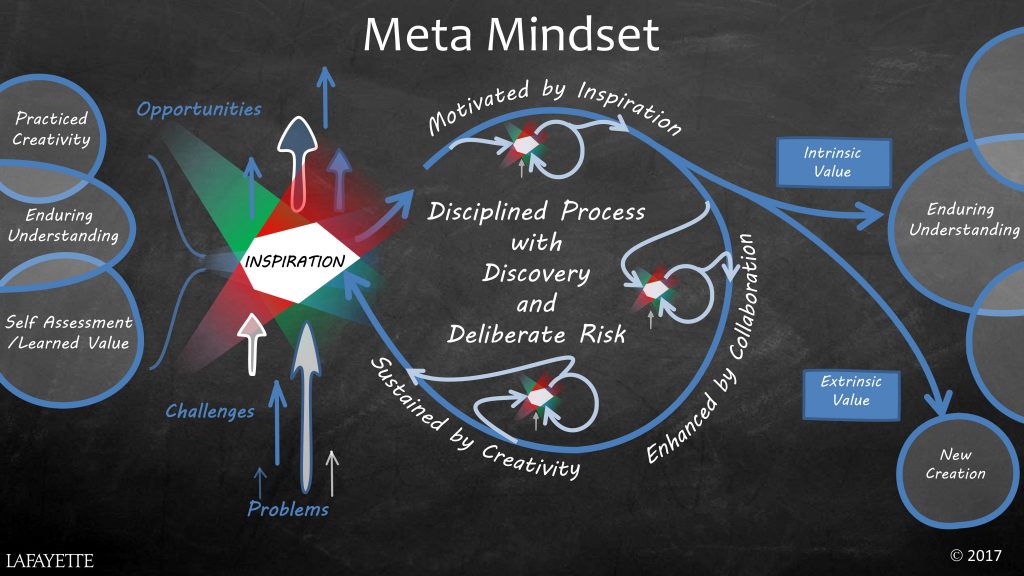Meta Mindset

Real problem-solvers operate from a broad perspective. They think strategically. They can see the big picture, but they are not overwhelmed by it, allowing them to make connections and develop inspired solutions that create value in new and meaningful ways.
Faculty members at Lafayette College developed the Meta Mindset to help teach this kind of thinking with the generous support of the Kern Entrepreneurial Engineering Network (KEEN).
KEEN has worked to develop Entrepreneurial-Minded Learning, which helps an individual broadly view challenges as opportunities to affect change.
Lafayette’s Meta Mindset goes an extra step. In addition to teaching students specific tools, characteristics, and traits for entrepreneurial thinking, Meta Mindset highlights the journey common to all entrepreneurial endeavors to create new social or commercial value.
This journey is always iterative, always requires management of a wide range of risks, is never solitary, and is never a “sure win.” Truly entrepreneurial individuals recognize the process from their own, often accidental, life experiences.
Meta Mindset invites faculty to deliberately create opportunities for students to practice this journey, building skills for recognizing opportunities, managing risks, seeking effective collaborators, and understanding the intrinsic and extrinsic value of thinking like an entrepreneur. Practicing the entrepreneurial journey is scalable—from individual assignments, projects, courses, and co-curricular opportunities to lifelong endeavors.
Continually practicing the journey empowers students to connect their personal development to a broad, entrepreneurial mindset. These experiences encourage students to engage their curiosity, move beyond fear of failure, and create value from unexpected opportunities.
This model conveyed to the students that challenges are expected in any complicated task so that they are better prepared for potential problems…
Meta Mindset offers a way for students to use each learning experience, no matter the scope or subject matter, to prepare for larger challenges and opportunities they will face in their own lives by using each experience to refine their own abilities to think entrepreneurially.
More than 50 faculty members from across the College are using the Meta Mindset for in-class projects and research. Extending the use of the Mindset across the College enables students to connect their experience in an art or music class, an engineering or science class, and an English class, to their own entrepreneurial, problem-solving mindset.
Professor and Chair, Russian and East European Studies, Ida Sinkevic noted that students writing research papers in her Byzantine Art and Architecture course “unanimously stated that the enduring value of the whole paper exercise is not just its quality, but the knowledge of the entire Meta Mindset process and its application to other situations and projects in their future endeavors.”
Mechanical engineering faculty Alexander Brown, Dan Sabatino, and Vishwa Somashekar made similar observations when they used the Meta Mindset to help teach problem-solving techniques in ME480: Control Systems and Mechatronics.
“It gave the students a common language with which to communicate their struggles constructively to us and to one another.
“When meeting with students outside of class hours, the mindset’s language made our discussions far more efficient, because students seemed to be able to pinpoint what they were struggling with fairly well.
“There is some preliminary, encouraging evidence that our approach this semester had objectively measurable benefits to student learning. This group of students scored a full 5 percentage points better on the final exam than last year’s group.
“The exam was almost identical, but covered more material and reflected a slightly more challenging first problem. While we have seen some palpable evidence that the course’s approach needs refinement, we are encouraged by the mindset’s apparent value in producing resilient, motivated students who are capable of truly synthesizing and applying the material.”